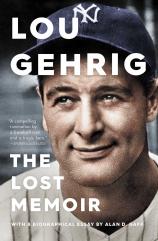Lou Gehrig: The Lost Memoir
Review
Lou Gehrig: The Lost Memoir
Would there be so many books about Lou Gehrig had he not died such a tragic death? Does the contraction of the disease that now bears his name make him any more or less a worthy subject than many of his contemporaries? At the risk of courting controversy, I don’t think it does.
Lou Gehrig did not have Babe Ruth’s oversize personality, nor did he have the same watershed impact on the national pastime (coming out of the Black Sox Scandal of 1919, which nearly ruined the sport) as did his teammate. Jackie Robinson had a major impact on the game when he broke the color barrier. Ted Williams was a war hero. Satchel Paige was a slice of Americana.
While there is no disputing Gehrig’s accomplishments, the same could be said about many of the superstars and Hall of Famers, such as Stan Musial, Ernie Banks and dozens of others, who are the subjects of multiple books. It was the sad demise of the “Iron Horse” that cemented his place in history.
"The last half of the book contains a brief biography by Alan D. Gaff, which I found quite interesting, offering tidbits of Gehrig’s life that I do not recall from previous works..."
Yet this latest look at Gehrig does stand apart, not only putting his own words to page but serving as an example of how differently sports figures wrote and were written about “back in the day.”
This “memoir” is basically a collection of articles published serially rather than in one volume. Gehrig --- most likely with the assistance of a co-writer --- discusses his early life and struggles, including a surprising lack of confidence regarding his abilities on the field and how he might not deserve a shot at the majors. There are few complaints or nasty comments about anyone other than himself. Over time, as his success grew, he became more comfortable with the accolades he deservedly received.
Gehrig’s final chapter begins, “And now I come to the end of my story of my baseball experience.” But the columns were written in 1927, not, as one might think, at the conclusion of his playing days since he says, “I am still just a kid at the game, and I realize it. I still have much to learn, and I hope I still have many years in which to learn it.” Of course, we know what’s to come, but apparently Gehrig has no inking. (This is the subject of Dan Joseph’s detailed LAST RIDE OF THE IRON HORSE: How Lou Gehrig Fought ALS to Play One Final Championship Season.)
The last half of the book contains a brief biography by Alan D. Gaff, which I found quite interesting, offering tidbits of Gehrig’s life that I do not recall from previous works, including Jonathan Eig’s wonderful LUCKIEST MAN: The Life and Death of Lou Gehrig.
I wonder what this exercise would look like if Gehrig were writing in more contemporary times? Would he reveal the stress of living in poverty with an alcoholic father and overprotective mother, the only survivor of several children who all died from various diseases? Would he admit to how he really felt about Ruth, perhaps share some of the Bambino’s dirty laundry? One gets the impression that Gehrig never said a discouraging word about anyone in his life.
Compare that with more recent works from players who, as the saying goes, couldn’t carry his jock. Nowadays there is no detail too lurid to share, whether it involves sexual encounters, substance abuse, or anything else that would be considered out of bounds in Gehrig’s era. But that follows the norm over the past near-century as silent movies turn to talkies, black and white to color, actual stories into shoot-’em-ups with ever-increasing body counts and explosions. That’s one reason I believe Gaff’s contribution to the Gehrig oeuvre will do well, at least with a certain audience who appreciates those kinder, gentler times.
Reviewed by Ron Kaplan on May 22, 2020
Lou Gehrig: The Lost Memoir
- Publication Date: May 18, 2021
- Genres: Memoir, Nonfiction, Sports
- Paperback: 240 pages
- Publisher: Simon & Schuster
- ISBN-10: 198213240X
- ISBN-13: 9781982132408




